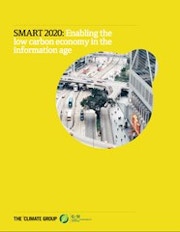
Transformation in the way people and businesses use technology could reduce annual man-made global emissions by 15 per cent by 2020 and deliver energy efficiency savings to global businesses of over EUR 500 billion ($800 billion), according to this report.
SMART 2020: enabling the low carbon economy in the information age- is the world’s first comprehensive global study of the Information and Communication Technology (ICT) sector’s growing significance for the world’s climate.
The report’s supporting analysis, conducted independently by international management consultants McKinsey & Company, shows that while ICT’s own sector footprint - currently two per cent of global emissions - will almost double by 2020, ICT’s unique ability to monitor and maximize energy efficiency both within and outside of its own sector could cut CO2 emissions by up to five times this amount. This represents a saving of 7.8 Giga-tonnes of carbon dioxide equivalent (GtCO2e) by 2020 - greater than the current annual emissions of either the US or China.
Although tele-working, video-conferencing, e-paper, and e-commerce are increasingly commonplace, the report notes that replacing physical products and services with their virtual equivalents (dematerialization and substitution) is only one part (six per cent) of the estimated low carbon benefits the ICT sector can deliver.
Far greater opportunities for emissions savings exist in applying ICT to global infrastructure and industry, the report examines four major opportunities where ICT can make further transformational cuts in global emissions. These exist globally within smart building design and use, smart logistics, smart electricity grids, and smart industrial motor systems.
KEY FINDING 1: The global ICT footprint. A new ‘socially networked’ generation around the world continues to drive unprecedented global demand for ICT hardware, software and services providing mobile and instant access to information.
To help, rather than hinder, the fight against climate change, the ICT sector must manage its own growing impact and continue to reduce emissions from data centres, telecommunications networks, and the manufacture and use of its products.
KEY FINDING 2: ICT’s enabling effect in cutting global emissions. The new report reveals significant opportunities for emissions reductions and how cost savings can be leveraged by applying ICT to global infrastructure and industry. Through enabling other sectors to reduce their emissions, the ICT industry could reduce global emissions by as much as 15 per cent by 2020 - a volume of CO2e five times its own footprint in 2020. If global businesses systematically used ICT to realize all of the solutions indicated in the report they would unlock global energy efficiency savings of over EUR 500 billion (*calculated as at December 2007 prices and not including a carbon price which may emerge if a global carbon market is established).
KEY FINDING 3: Getting SMART about ICT. Going forward, the report recommends a SMART framework is implemented, outlining key actions required by the ICT sector, national governments and industry. Transformation of the economy will occur when standardisation (S), monitoring (M) and accounting (A) of energy consumption prompt a rethink (R) in how we optimise for energy efficiency and how we live, work and play in a low carbon world. Through this enabling platform, transformation (T) will occur when the business models that drive low carbon alternatives can be developed and diffused at scale across all sectors of the economy.
Read more on SMART2020: Enabling the low carbon economy in the information age
Publish your content with EB Publishing
It's about who you reach. Get your news, events, jobs and thought leadership seen by those who matter to you.









